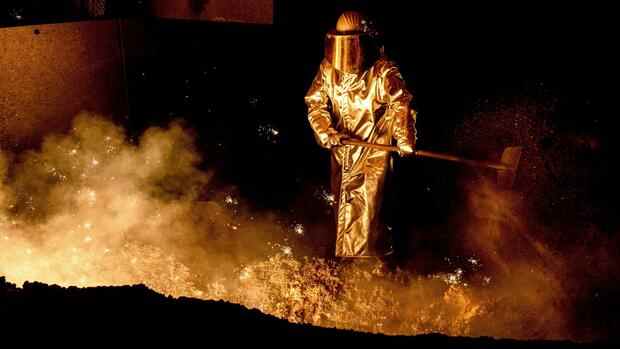The explosion in electricity prices is also having an impact on the energy-intensive steel industry.
(Photo: dpa)
Dusseldorf The steel industry is sounding the alarm because of the sharp rise in energy prices. “We are very concerned about the rising energy costs, with which the steel industry in Germany is confronted,” said the President of the Steel Federation, Hans Jürgen Kerkhoff, on Tuesday when asked by the Reuters news agency.
Sharply increased electricity prices threatened the international competitiveness of electricity-intensive processes, such as the electric steelworks, with a massive burden. The second largest German steel group Salzgitter stated that production restrictions could not be ruled out at its electricity-intensive location in Peine. Alongside the chemical, aluminum and cement industries, the steel industry is one of the largest consumers of electricity.
The building materials group HeidelbergCement therefore announced that it wanted to raise sales prices due to the rise in costs due to the high electricity prices. “Such a cost explosion is unique. We are being forced to raise prices significantly in the short term, ”said a HeidelCement spokesman. Normally, the prices for the energy-intensive building materials are only adjusted at longer intervals.
Gas and electricity prices in Europe have climbed to record levels in the past few months. The reasons for this include the high demand from the economy after the height of the corona crisis, the hunger for energy in Asia, weak green electricity generation, less full gas storage facilities and higher prices for pollution rights. Wholesale prices at the important Dutch gas trading point TTF have risen by more than 400 percent since January. The wholesale prices for electricity have doubled.
Top jobs of the day
Find the best jobs now and
be notified by email.
Heavy industry under pressure
For years, the steel industry has been feeling the pressure from competitors in the Far East who have to meet less stringent environmental requirements. In addition, heavy industry in Europe is facing the greatest restructuring in its history in order to achieve the goal of climate neutrality. Steel Association President Kerkhoff warns of excessive loads. “The transformation to a climate-neutral steel industry based on renewable energies and hydrogen is also made considerably more difficult by the additional energy costs.”
When it comes to electricity, Salzgitter and Thyssenkrupp can partially supply themselves with steelmaking. “The Salzgitter and Mühlheim locations are secured with 100 percent self-sufficiency from gas-fired power generation”, explain the Lower Saxony. For all other group companies, Salzgitter secures partial quantities with a lead time of several years. The current price increases then have a time lag.
“At our integrated main location in Duisburg, we produce relatively self-sufficiently,” reports Thyssenkrupp Steel Europe. The plant in Duisburg even supplies 20,000 neighboring households in the Ruhr area city with electricity. “The increase in electricity prices affects us indirectly, however, because, for example, the prices for the industrial gases we use are linked to electricity prices.” There are no production adjustments or shutdowns due to the increased electricity and gas prices.
According to a report by Spiegel, the Swiss Steel Group, which is represented in Germany by several stainless steel plants, sees the federal government as having a turnaround. “We now need immediate relief,” said CEO Frank Koch the magazine. Large amounts of electricity would be required for production. A stop in production or the relocation of shifts is conceivable in the short term.
More: Gas price shock for the global economy: “Energy crisis is becoming a question of survival for many companies”

